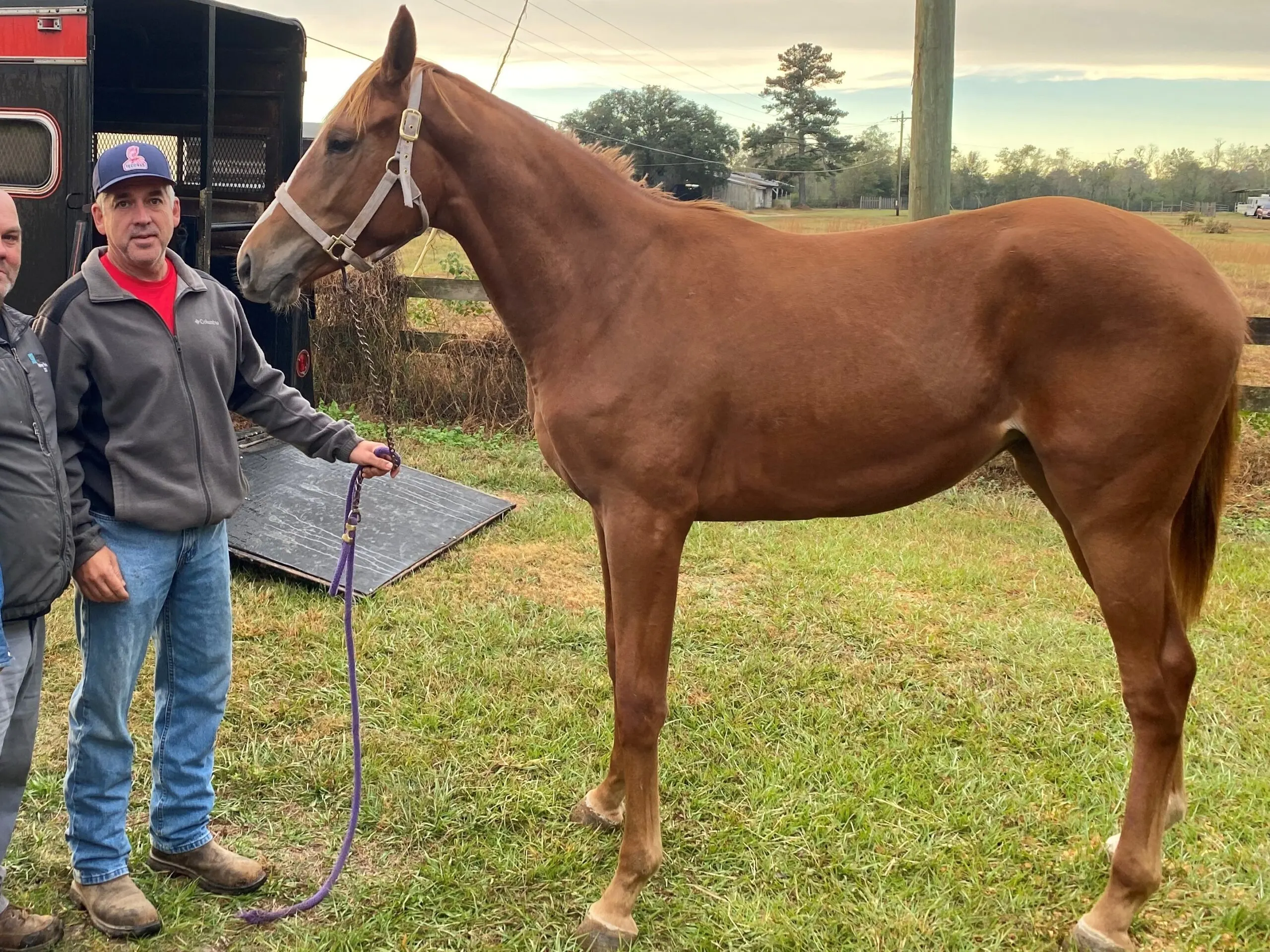Last updated: January 10, 2024
Did you know that, unlike humans, foals (baby horses) can start their lives either completely toothless or with a few tiny teeth already peeking through their gums? This fascinating start to their dental journey underscores the unique and intriguing nature of equine dental health, a critical aspect often overlooked in the early stages of a horse’s life.
As a passionate horse owner with years of experience in horse care, I’ve witnessed firsthand the impact of dental health on a foal’s overall well-being and development. From their first nuzzle to their first nibble of grass, the condition of their teeth plays a pivotal role in their growth and health.
In this article, we’ll dive into the intriguing world of foals’ dental development. We’ll explore how these young horses transition from gummy smiles to a full set of teeth and why this process is vital for their nutrition, health, and even behavior. Whether you’re a seasoned horse owner, a new enthusiast, or simply curious about horses, understanding the dental dynamics of foals offers a fascinating glimpse into their early life stages.

The Basics of Foal Dental Development
Understanding the development of a foal’s teeth is crucial for their overall health and well-being. Let’s delve into the key stages of this fascinating process.
When Do Foals Start Growing Teeth?
- Birth to 2 Weeks: Foals are usually born without teeth. However, within the first two weeks, they start to develop their ‘milk’ or deciduous teeth.
- Incisors: The first to appear are the incisors, typically within the first 8 days. These are the front teeth used for biting off grass.
- Premolars: Following the incisors, premolars start to emerge. These are located at the back of the mouth and are crucial for grinding food.
Timeline of Tooth Eruption in Foals
- 8 Days: Central incisors erupt.
- 8 Weeks: Intermediate incisors appear.
- 8 Months: Corner incisors and additional premolars make their appearance.
Types of Teeth and Their Functions
- Incisors: Located at the front, used primarily for biting and cutting.
- Premolars: Situated at the back, essential for grinding and mashing food.
Anatomy of a Foal’s Mouth
Here is the diagram illustrating the basics of foal dental development:
A foal’s mouth undergoes significant changes in the first few months of life.
Deciduous (Milk) vs. Permanent Teeth
- Deciduous Teeth: These are the first set of teeth that foals develop. They are temporary and eventually replaced by permanent teeth.
- Permanent Teeth: Start to replace the milk teeth around the age of 2.5 to 3 years. These are stronger and larger, designed to last a lifetime.
These basics provide a foundation for ensuring proper dental care and monitoring as the foal grows. Regular check-ups with a veterinarian are essential to identify and address any dental issues early on.
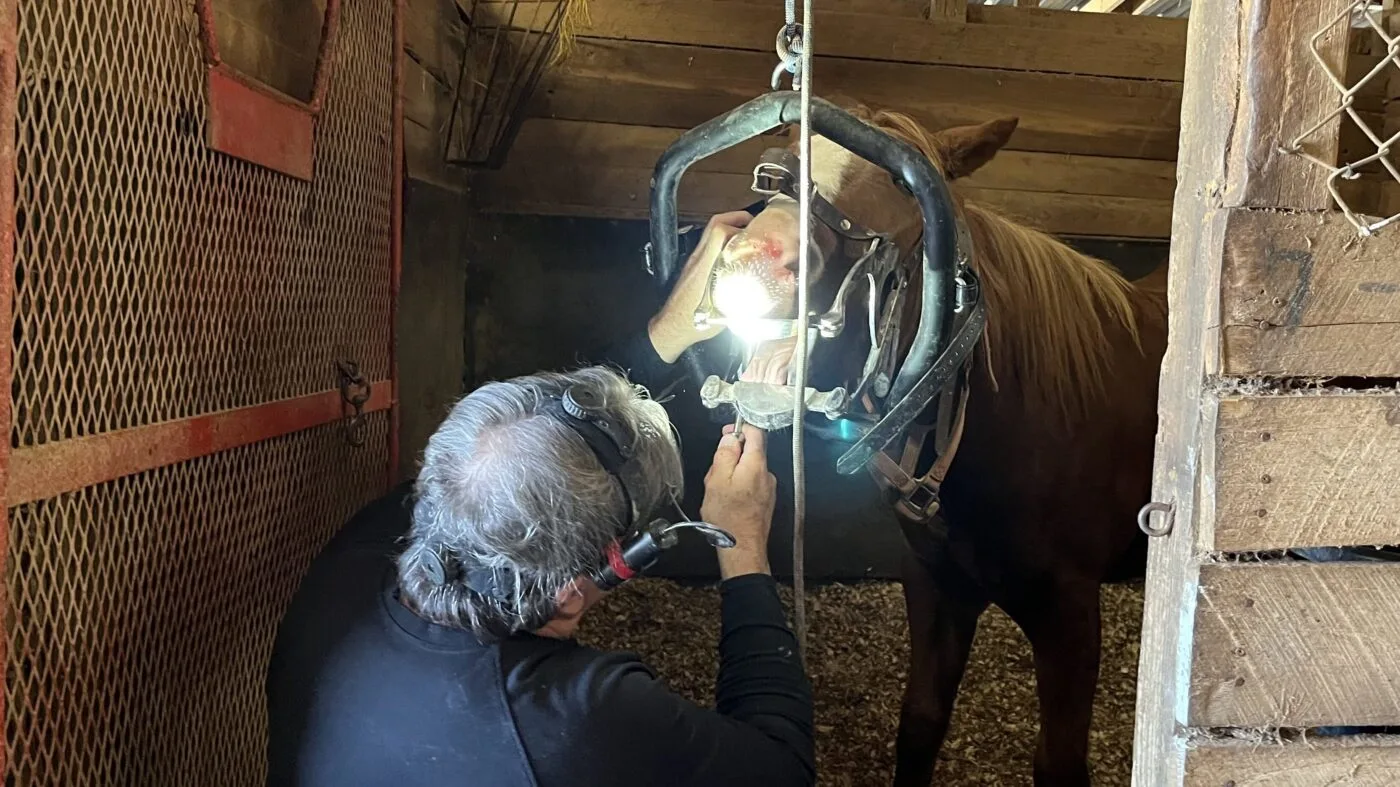
Expert Insights on Foal Dental Health
Proper dental care is crucial for the health and development of foals. Let’s explore insights from equine dental experts and delve into common dental anomalies in foals.
Insights from Equine Dental Experts
Dental care is crucial for young horses, especially from birth to five years, a period marked by significant dental changes. Juvenile horses often face malocclusion or abnormal tooth development, which, if addressed early, can prevent future problems. Citation “Equine dental care” by the Veterinary Teaching Hospital at Colorado State University.
“Foals should be examined shortly after birth and periodically during the first year to diagnose and correct congenital dental abnormalities. Yearlings have been found to have enamel points sharp enough to damage cheek and tongue tissue. Floating will make them more comfortable.” (American Association of Equine Practitioners) For more detailed information, you can read the full article here.
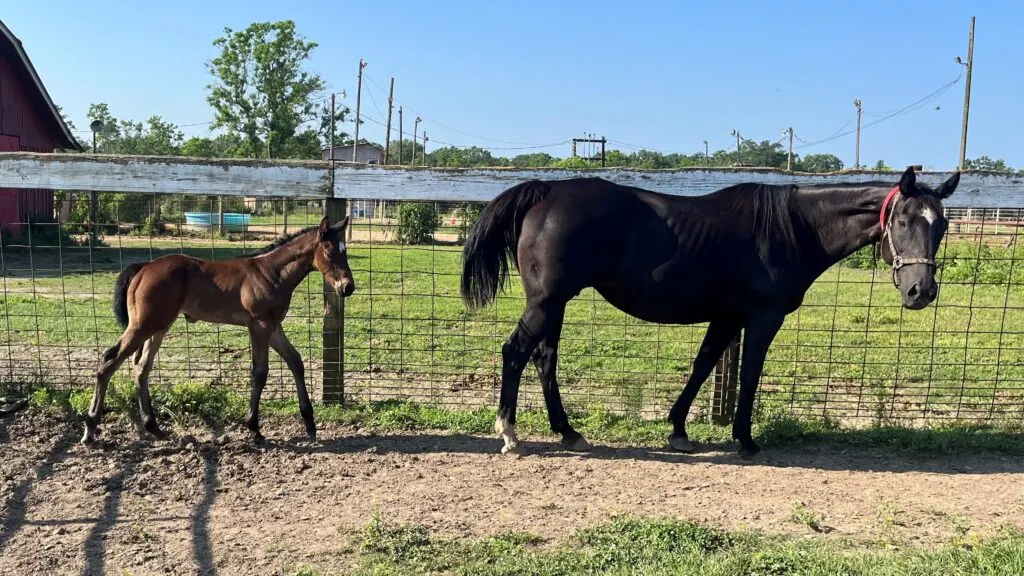
Common Dental Issues in Foals
Parrot-mouth
- Description: A congenital condition where the upper jaw is longer than the lower, leading to hooks on molar teeth and abnormal incisor growth.
- Treatment: Regular dental check-ups to monitor growth; dental procedures to remove hooks and correct incisor length.
Sow-mouth
- Description: The opposite of parrot mouth, where the lower jaw protrudes further than the upper jaw.
- Impact: Causes abnormal tooth growth due to improper mouth closure.
Wry-nose
- Description: A condition where the upper jaw and nose deviate to one side, causing misalignment of teeth.
- Additional Issues: Often accompanied by a deviated nasal septum, leading to airway obstruction and breathing difficulties.
Supernumerary Teeth
- Description: The presence of extra teeth in a horse’s mouth is a rare but notable condition.
Hooks and Ramps
- Hooks: Develop due to misaligned molars, often in cases of overbite or underbite.
- Ramps: Similar to hooks but with a more gradual slope, affecting the movement of the lower jaw and potentially the jaw hinge joint.
Developmental Cysts and Avulsed Incisors
- Cysts: These can occur in the eruption area of new teeth, sometimes leading to infections.
- Avulsed Incisors: Complete displacement of a tooth, typically due to trauma.
Sharp Enamel Points and Impacted Wolf Teeth
- Sharp Enamel Points: Develop on molars due to the horse’s chewing method, requiring filing down.
- Impacted Wolf Teeth: These can cause pain and are often extracted.
Missing Teeth
- Observation: Regular checks for missing teeth, which can impact a foal’s eating habits and overall dental health.
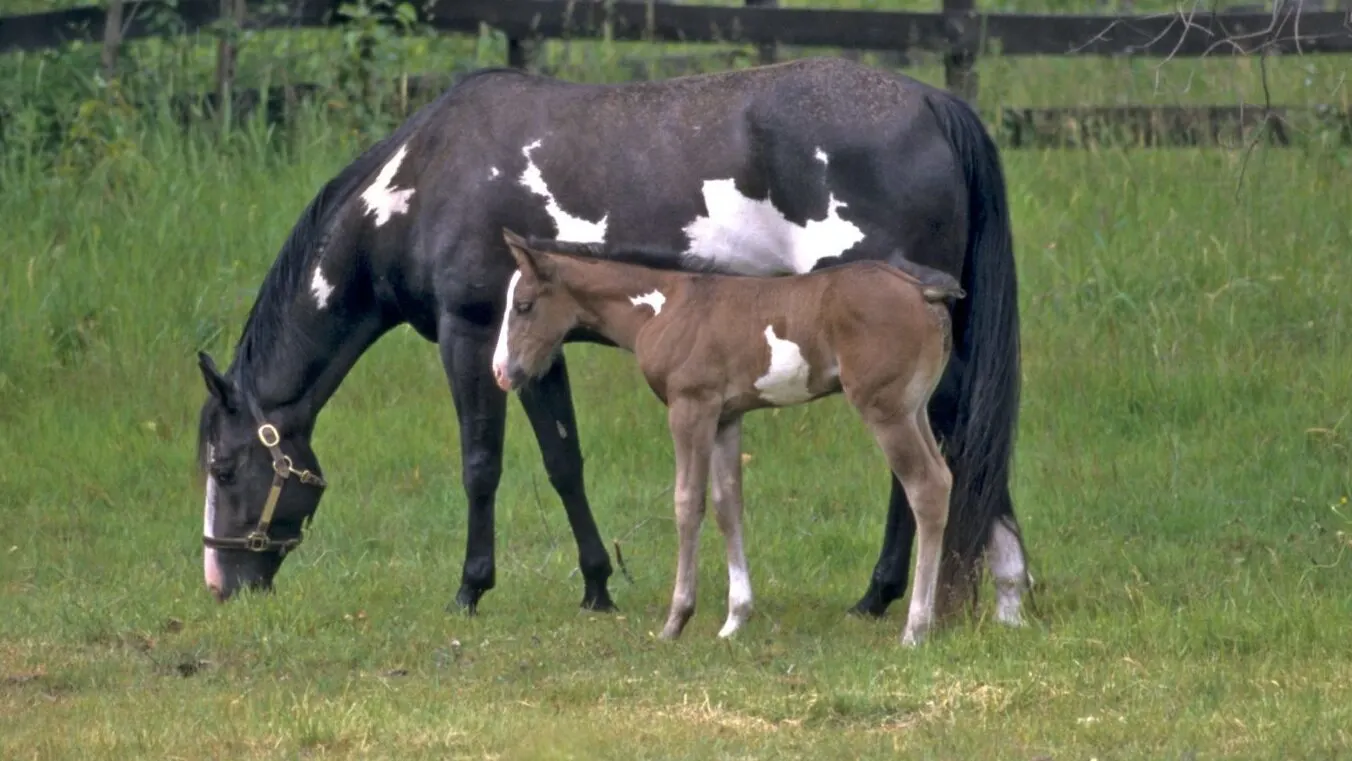
Dental Care for Foals
Proper dental care is essential for the health and development of foals. Let’s explore the importance of routine dental check-ups and home care tips for maintaining optimal dental health in young horses.
Routine Dental Check-ups
- Importance of Early Dental Exams:
- Early dental exams are crucial for identifying and addressing any developmental issues or anomalies in a foal’s teeth.
- Regular check-ups help ensure that the teeth are erupting and aligning correctly, which is vital for proper feeding and jaw development.
- What to Expect During a Foal Dental Check-up:
- Examination of the mouth and teeth for any signs of abnormality or discomfort.
- Checking the alignment of jaws and teeth and the eruption pattern of both deciduous and permanent teeth.
- Your veterinarian or equine dentist may also look for signs of common dental issues like retained caps, wolf teeth, or overbites.
Home Care Tips
- Basic Dental Care Practices Owners Can Do at Home:
- Regularly check your foal’s mouth and teeth for any signs of abnormal growth or discomfort.
- Introduce a gentle mouth-handling routine early on to make future dental check-ups and treatments easier.
- Signs to Watch for Indicating Dental Issues:
- Difficulty in chewing or dropping food from the mouth.
- Unusual mouth odor or excessive salivation.
- Resistance or discomfort when bridling or during bit training.
- Behavioral changes, such as head tossing or reluctance to eat, which may indicate dental discomfort.
I like to incorporate these practices into my daily care routine; by doing this, you can play a significant role in ensuring the dental health and overall well-being of your foal. Remember, early detection and intervention are key to addressing dental issues effectively.
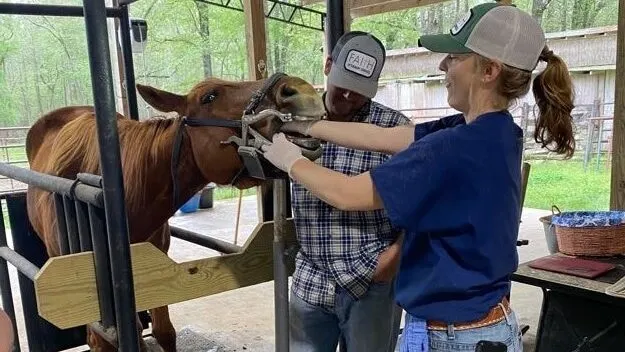
Frequently Asked Questions about Foal Teeth
Below are answers to some common questions about foal teeth that I gathered from various horse forums and social media platforms.
At what age do foals start getting their teeth?
Foals typically start getting their first teeth, known as deciduous teeth or milk teeth, within the first week after birth. The first to appear are usually the incisors.
How can I tell if my foal is having dental issues?
Signs of dental issues in foals include difficulty in chewing, excessive drooling, reluctance to eat, or swelling around the jaw. Regular dental check-ups are crucial for early detection and treatment.
What are wolf teeth, and should they be removed?
Wolf teeth are small, vestigial teeth that can appear in front of the molars. They are often removed because they can cause discomfort, especially when a bit is used in training.
How often should a foal’s teeth be checked by a veterinarian?
It’s recommended to have a veterinarian check a foal’s teeth within the first few months after birth and then regularly, as advised by the vet, typically every six months to a year.
Can foals have overbites or underbites, and how are they treated?
Yes, foals can have overbites (parrot mouth) or underbites (sow mouth). These conditions should be evaluated by a veterinarian. In some cases, corrective dental devices may be used.
What are the common dental problems in foals?
Common dental problems in foals include retained caps (baby teeth that don’t fall out), sharp enamel points, and misalignment of teeth. Regular dental care is essential to address these issues.
When do permanent teeth start to appear in foals?
Permanent teeth start to appear when a foal is around 2.5 to 3 years old and continue to erupt until about 5 years of age.
Is it normal for a foal to lose teeth?
Yes, it’s normal for foals to lose their deciduous (milk) teeth as their permanent teeth come in, similar to human children losing their baby teeth.
How can I care for my foal’s teeth at home?
Home care includes monitoring your foal’s eating habits and checking for any signs of discomfort or abnormalities in the mouth. Early familiarization with mouth handling can also make future dental check-ups easier.
Do dental issues in foals affect their overall health?
Yes, dental issues in foals can affect their nutrition intake and overall health. Proper dental care is essential for their growth and development.
These FAQs provide a basic understanding of foal dental care, but it’s always best to consult with a veterinarian for specific concerns and regular check-ups.
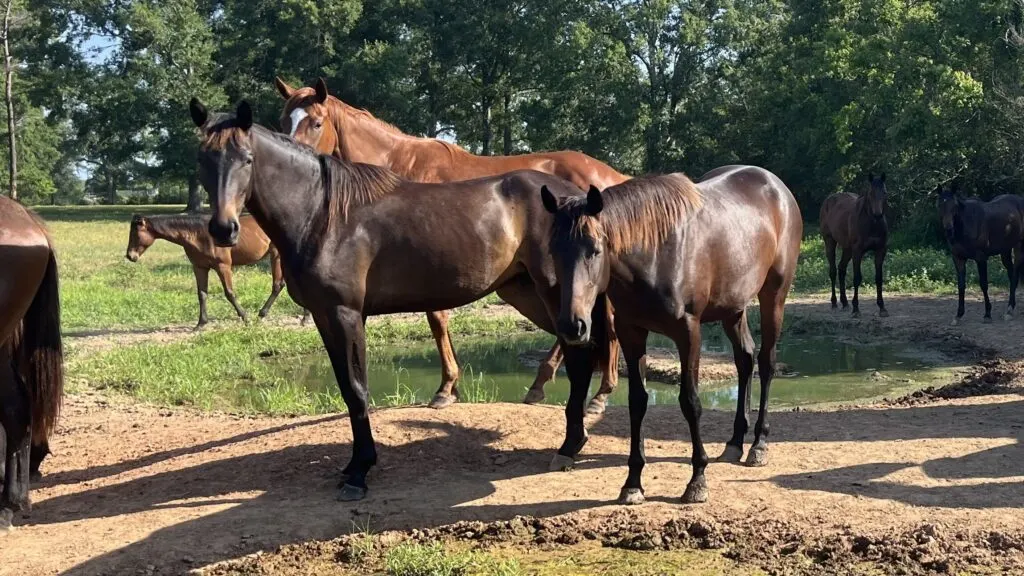
Real-life Examples
Below are some real-life case studies of foals with dental issues, highlighting the importance of early detection and proper dental care.
Case Study: Retained Deciduous Teeth in a Yearling
- Background: A yearling I bought had difficulty eating, which was coupled with noticeable discomfort.
- Diagnosis: The veterinarian discovered retained caps (deciduous teeth) that were obstructing the eruption of permanent teeth.
- Treatment: The retained caps were carefully removed under sedation.
- Outcome: The yearling showed immediate improvement in eating habits and behavior, highlighting the importance of addressing such issues promptly.
Case Study 2: Wolf Teeth Causing Bitting Problems
- Background: I have had many horses that had issues with their wolf teeth. Recently, a 2-year-old horse in training began showing resistance to the bit and discomfort during riding.
- Diagnosis: Examination revealed the presence of wolf teeth that were interfering with the bit.
- Treatment: The wolf teeth were extracted, and the horse was given time to heal.
- Outcome: Post-extraction, the horse accepted the bit comfortably and showed significant improvement in training and performance.
My examples demonstrate the variety of dental issues that can occur in young horses and the positive outcomes that can be achieved with timely and appropriate veterinary care. They underscore the importance of regular dental check-ups and early intervention in ensuring the health and well-being of foals.
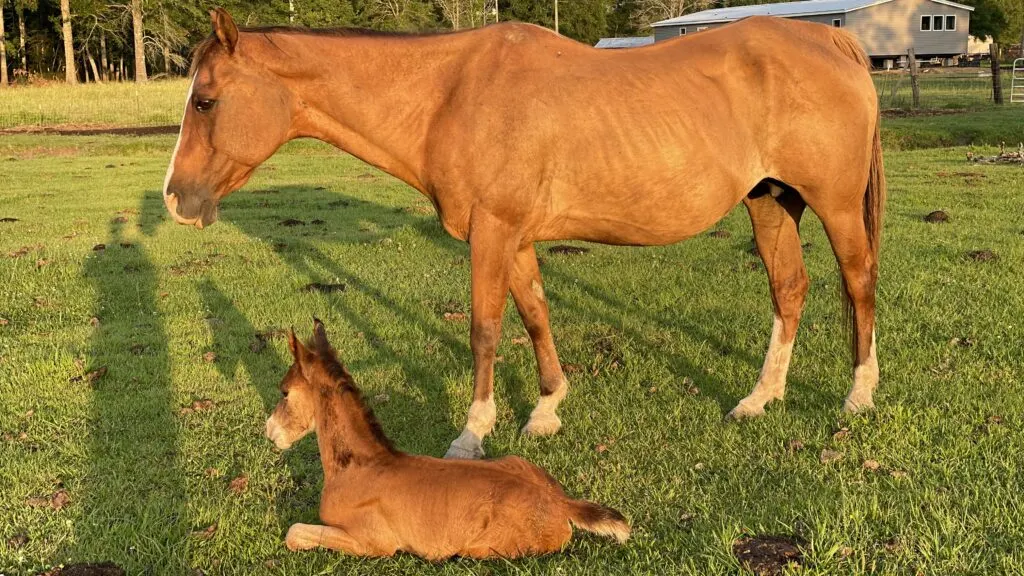
Advanced Topics in Foal Dental Health
Latest Research and Advancements in Equine Dental Care
- 3D Imaging and Teledentistry:
- Recent advancements include the use of 3D imaging techniques to better understand and diagnose complex dental issues in foals.
- Teledentistry, using digital tools for remote consultation, is becoming increasingly popular, allowing for expert opinions from specialists worldwide.
- Pain Management and Sedation Techniques:
- Newer sedation protocols and pain management strategies are being developed to make dental procedures less stressful and more comfortable for young horses.
- Research is ongoing into the most effective and safe sedatives specifically for dental procedures in foals.
- Dental Appliances and Braces:
- Custom dental appliances and braces are being designed for foals with severe malocclusions, similar to orthodontic treatments in humans.
- These appliances are tailored to each foal’s specific dental structure, providing more effective and faster results.
Impact of Nutrition on Dental Development
- Role of Nutrition in Dental Health:
- Nutrition plays a crucial role in the dental development of foals. Diets deficient in essential minerals and vitamins can lead to poor dental health and development.
- Research shows that adequate levels of calcium, phosphorus, and vitamins A, D, and E are essential for proper dental formation.
- Forage and Chewing Efficiency:
- Studies indicate that the type of forage fed to foals can impact their dental wear patterns. Coarser forage requires more chewing, which can help in the proper alignment and wear of teeth.
- The introduction of different textures in the diet from a young age can promote healthy dental development.
- Feeding Practices and Dental Abnormalities:
- Research is exploring how different feeding practices, such as feeding from the ground vs. elevated feeders, affect dental wear and development in foals.
- Early introduction to hard feeds and their impact on the eruption and wear of deciduous teeth is also a subject of study.
These advanced topics in foal dental health highlight the importance of ongoing research and development in equine dentistry. They also emphasize the need for horse owners and caretakers to stay informed about the latest practices and findings in this field to ensure the best care for their young horses.
Below is a YouTube video that covers some common issues horses have with their teeth.
Conclusion: Baby Horses’ Teeth
In summary, the dental health of foals is a critical aspect of their overall well-being and development. Key takeaways include:
- Early Dental Care: Starting dental check-ups within the first few weeks of a foal’s life is crucial. This early intervention can prevent and address common issues like malocclusions, retained caps, and wolf teeth.
- Regular Monitoring: Bi-annual or annual dental exams are essential for tracking the development of your foal’s teeth, ensuring proper alignment, and addressing any abnormalities promptly.
- Nutrition’s Role: A balanced diet rich in essential nutrients plays a significant role in healthy dental development. The texture and type of forage can also influence dental wear and health.
- Advancements in Care: Stay informed about the latest advancements in equine dental care, including new technologies and treatment methods, to provide the best care for your foal.
- Professional Guidance: Always consult with a veterinarian for any dental concerns. They can provide tailored advice and treatment options based on your foal’s specific needs.
Remember, proactive and preventive dental care is key to ensuring your foal grows into a healthy, happy horse with a strong and functional set of teeth. Don’t hesitate to reach out to equine dental specialists for guidance and support in maintaining your foal’s dental health.
Call to Action: Join the Conversation and Explore More
We hope this article has provided you with valuable insights into the world of foal dental care. Now, we’d love to hear from you!
- Share Your Experiences: Do you have stories or experiences related to foal dental health or baby horses in general? Maybe a challenge you faced or a success story? Please share them in the comments section below. Your insights could be immensely helpful to other horse owners and enthusiasts.
- Ask Questions: If you have any questions or need clarification on any aspect of foal dental care, feel free to ask. Our community of experts and fellow horse lovers is here to help.
Your participation makes our community stronger. Let’s continue to learn and grow together in our journey towards better equine health and care! 🐴💬📚
Connect with Me
- Email: [email protected]
- Social Media: Follow me on Facebook for updates, tips, and insights into the world of horses.
- Website: Visit my website horseracingsense.com, for more articles, resources, and information about horses.
- YouTube
Additional Resources
For those keen to delve deeper into equine health and dental care, here’s a curated list of resources, including articles from Horse Racing Sense and other valuable external sources:
Articles from Horse Racing Sense:
- Why Horses Foam At The Mouth: Causes & Care For Foamy Mouth
- A Horse’s Teeth: What Can We Learn, Age, Health, And More?
- Understanding Foals (Baby Horses): A Development Guide
- Is A Pony A Baby Horse? Ponies And Foals: Key Differences
Online Forums and Communities:
- The Horse Forum: A vibrant community for discussing all things related to horses, including health and dental care. Visit The Horse Forum
- Chronicle Forums: Offers a platform for horse enthusiasts to share experiences and advice.
Equine Educational Sites:
- American Association of Equine Practitioners (AAEP): Provides comprehensive information on horse health. Visit AAEP
- EquiMed – Horse Health Matters: A resource for detailed articles on various aspects of horse health. Visit EquiMed
Equine Dental Sites:
- International Association of Equine Dentistry (IAED): A platform for the latest in equine dentistry. Visit IAED
- Equine Dental Practice: Offers insights into modern equine dentistry practices. Visit Equine Dental Practice
Magazines and Books:
- Equus Magazine: Covers a wide range of topics on horse care and health. Subscribe to Equus Magazine
- “Complete Horse Care Manual” by Colin Vogel: A comprehensive guide covering all aspects of horse care, including dental health.
- “Equine Dentistry” by Jack Easley, Padraic M. Dixon, and James Schumacher: A detailed book on equine dental care.
These resources offer a wealth of information for both horse owners and enthusiasts, enriching your understanding and management of equine health and dental care.
Meet Miles Henry
An avid equestrian and seasoned racehorse owner, Miles Henry brings his extensive experience to the equine world, proudly associating with the AQHA, The Jockey Club, and various other equine organizations. Beyond the racetrack, Miles is an accomplished author, having published various books about horses, and is a recognized authority in the field, with his work cited in multiple publications.
🔗 Connect with Miles:
Twitter
Facebook
YouTube: Check out race highlights, horse care tips, and more!

